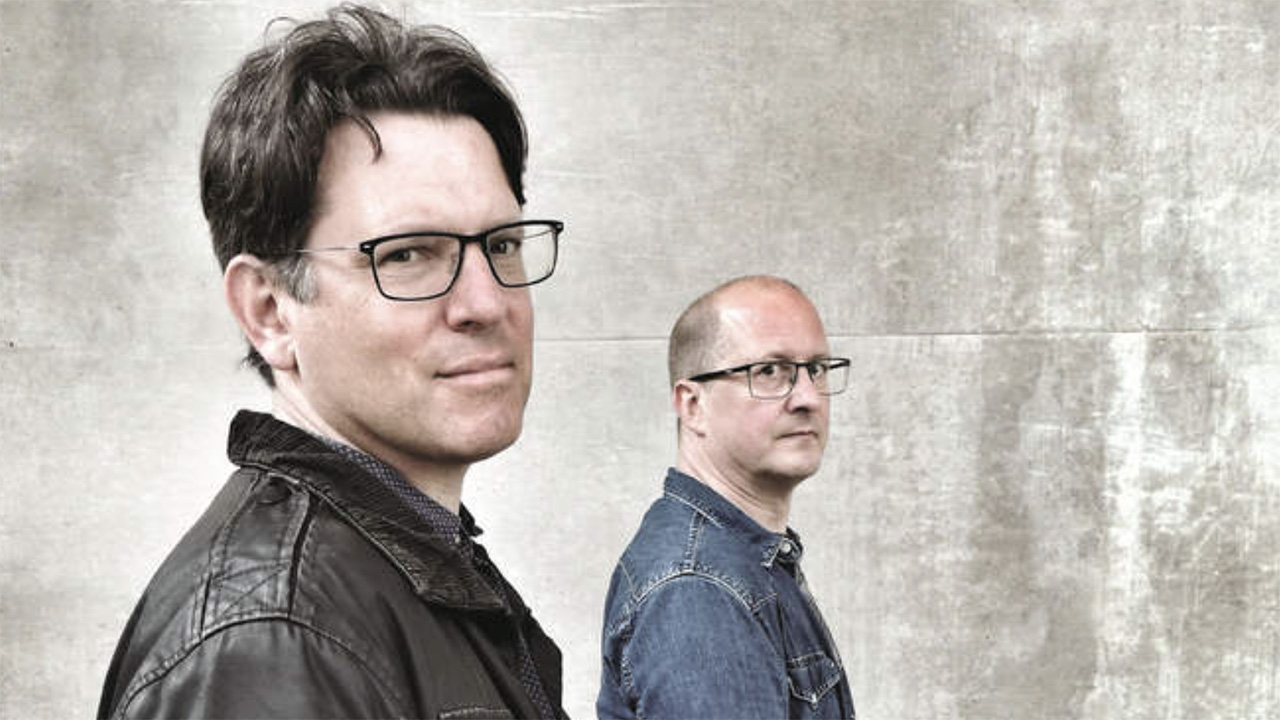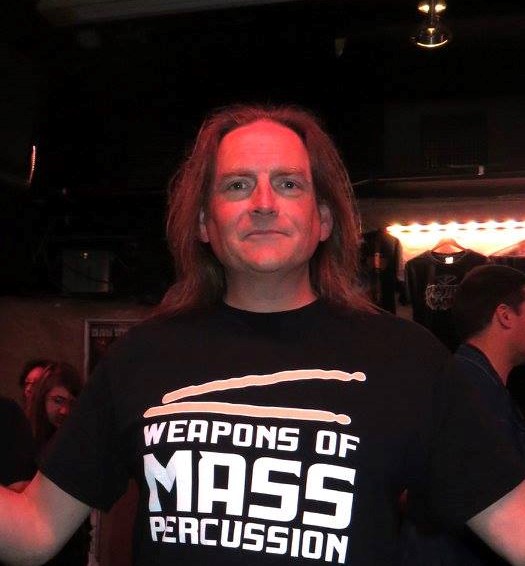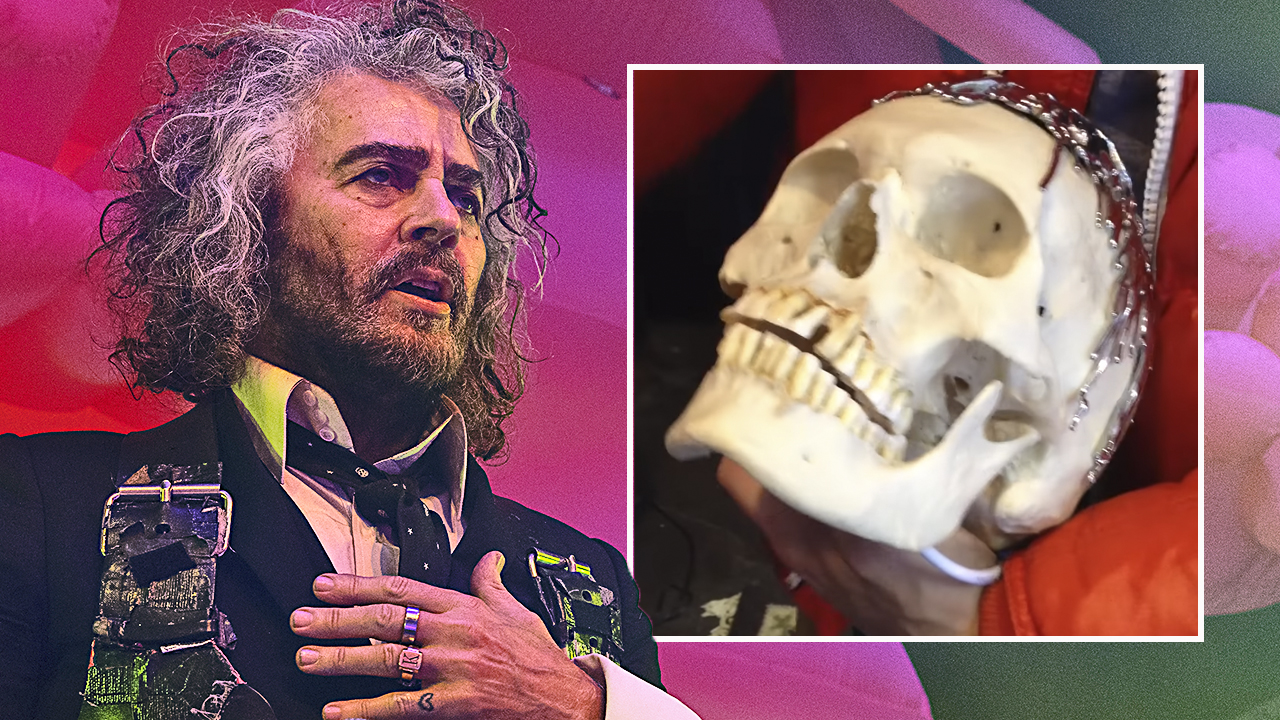“We categorise it as ‘bleaktastic’… how and what I sing often stem from my frustrations with my bloody back!” New monster stories from Hats Off Gentlemen It’s Adequate
The Light Of Ancient Mistakes continues into the abyss of human nature, with dark humour and an offer of hope, driven by singer Malcolm Galloway’s debilitating illness

London-based duo Hats Off Gentlemen It’s Adequate are back with their seventh album, The Light Of Ancient Mistakes, which explores war, climate change and personal health battles. Malcolm Galloway and Mark Gatland reveal the story behind the record and their easygoing musical partnership.
It’s been just over 10 years since Invisible provided first sight of the sometimes spiky, baleful, ambient, enraged, dystopian, yet always thoughtful world of Hats Off Gentlemen It’s Adequate. Originally accompanied by guitarist and drummer guests, the duo of Malcolm Galloway and Mark Gatland on bass multi-instrumentalist two-man operation, joined occasionally by Galloway’s wife, Kathryn Thomas, on flute.
Thematically their seventh album, The Light Of Ancient Mistakes, is “heartfelt and honest – possibly the most Hats Off album we’ve ever done,” according to an ebullient Gatland. It covers ground familiar to existing fans, from sci-fi and historically inspired tales and the implications of technological progress, to our role both in the damage to and salvation of our planet, and topical socio-political observations. Opener Sold The Peace is a great funk-fuelled, insistent example of the latter.
“It’s about the fact that we fought the Cold War, going to the brink of nuclear war, and once it ended various countries seem to have been able to purchase influence in some of our democracies, with relatively little money compared with how much was spent in the Cold War,” explains Galloway. “It’s a little bit different to most of what we’ve done; one of our more explicitly political – with a small ‘P’ – songs. It’s fairly angry.”
“We try not to be preachy, but just remind people to look around themselves and notice some of this stuff. And I love the line, ‘Auctioned lunches with your chosen leaders’ – one of my favourite lyrics from Malcolm,” adds Gatland. At the other end of the album, Burn The World returns to one of Galloway’s ongoing concerns: environmental damage. Written as a heartfelt, imagined future commentary on what humanity has done to the planet, it embodies both deep sadness and a smouldering indignance. “I heard it as a Stevie Wonder or Aretha protest song thing,” Gatland reflects.
At the heart of the album is the minor epic Walking To Aldebaran. Based on the novella of the same name by Adrian Tchaikovsky, it’s the unsettling story of a lost astronaut slowly going mad, whose very being is gradually altered by a well-meaning, yet horribly misguided machine. “It’s definitely the biggest, trickiest piece on the album,” muses Galloway, “and we’d describe it as somewhere between prog metal, Andrew Lloyd Webber and [late contemporary composer] Peter Maxwell Davies! It jumps from genre to genre partly to reflect the main character’s exploding psyche. I think it’s my favourite track on the album, partly because it goes in some new directions for us, being both more ‘metally’ and more ‘Lloyd Webbery’ than we’ve done before,” he says with a grin.
The source novel ultimately sees the main character doing some truly terrible, horrific things, but Galloway chose not to go that far. “We stop the narrative at a point when he’s still a somewhat sympathetic character and he hasn’t lost his humanity completely, before he becomes the monster. It’s that theme of how monsters don’t look so different to us or how we might become monsters in the wrong situation. It’s a kind of recurring theme that we play around with.”
Sign up below to get the latest from Prog, plus exclusive special offers, direct to your inbox!
Across their seven albums, HOGIA have always explored some grim and uncomfortable ideas, but is it all meant to be unremittingly ghastly? “I’m not being disrespectful of those who are able to write a good three-minute pop song that’s cheerful – I think it’s a great skill, just not one that I have,” admits Galloway. “We categorise what we do as ‘bleaktastic’. I hope that we’re not just being self- indulgently miserabilist – I think it’s more that we tend to look into the abyss with a little bit of dark humour. We’re always talking about the nature of humanity, but there’s always hope there, though – we’re always trying to offer hope.”
With the album featuring programmed drums (as has become customary for HOGIA), Walking To Aldebaran boasts some particularly well-crafted and inventive parts. “I did once have a drum kit,” explains Galloway. “I’m not saying I was a particularly good drummer but I played enough to understand what it entails, so when I write it’s from the point of view of somebody with four limbs. I love real drums, but using the programmed drums for us is very effective.”
“I’ve got to that point now in the process of hearing Malcolm’s tracks that I forget it’s not a drummer,” adds Gatland.
Galloway writes the majority of the initial song ideas, which then get sent between them. Friends since childhood, the pair have an easy and intuitive partnership and Gatland isn’t precious about anything he throws into the mix. “We know each other so well as friends, there’s no ego involved, so if anything of mine doesn’t get used, it doesn’t matter.”
This back-and-forth technique of adding, finessing and tweaking can go on for months. “We can go over individual parts in obsessive detail, cycling around a couple of bars and making tiny changes to things that probably nobody else will ever notice,” explains Galloway. “There can be easily 80 to 100 versions of a track.”
One area that has developed over this album and its predecessor, The Confidence Trick, is Gatland’s role as Galloway’s vocal producer. It’s surprising, perhaps, to anyone who has seen Galloway’s often impassioned and committed performances live, but the frontman is, by his own admission, “a bit shy with the vocals.”
“I’m not enormously confident and I would be tempted, if I was recording on my own, to be pulling everything back and being more reserved with it,” he says. “It’s really nice with Mark doing the producing saying, ‘Okay, well, that’s about six-and-a-half, let’s try to turn the performance up to seven-and-a-half.’”
Something that pervades much of what Galloway has been able to do with the band, and which acts as the inspiration for the pop punk/new wave-flavoured Imtiredandeverythinghurts, is the debilitating condition Ehlers-Danlos Syndrome, which put paid to a career as a hospital doctor and manifests for him as chronic exhaustion and extreme back pain. It also has a direct bearing on how he constructs and delivers vocals. “I’ve come to realise that how and what I sing often stem from my frustrations with my bloody back!” he confesses.
So what musical influences do the pair bring to HOGIA? It’s an interesting combination of artists – Gatland cites Kate Bush, Iron Maiden, Marillion, Pure Reason Revolution, Japanese dream pop and 90s indie bands, while Galloway references Steve Reich and Philip Glass.
And they share a common point of reference in Pink Floyd’s Delicate Sound Of Thunder. There is more than a little Floyd suggested by the new album’s title track, both in overall sound and feel, but also in the shape of Galloway’s guitar soloing. “If somebody was saying: ‘Pick a guitarist that you could sound a bit like,’ I would definitely go with Gilmour and Steve Rothery. I really like musicians who say a huge amount with a single note, like a singing style of guitar playing,” he says.
Gary has contributed reviews and news features for Prog Magazine for over a decade now. A fan of prog and heavy rock since childhood, his main areas of interest are classic and symphonic prog, prog-metal and modern acts bringing in fresh influences to the genre. He has a professional background in youth and community work, he teaches drum kit in schools and is a working musician. Gary was the drummer in semi-legendary NWOBHM band Praying Mantis for a couple of years and has been a member of indie-prog-pop-art-rock combo The Mighty Handful for more than twenty years. He loves cats and skiing, and has a Blue Peter badge.

